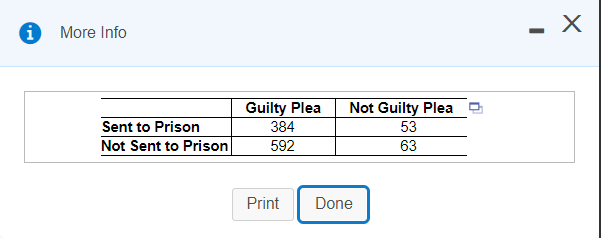Many people believe that criminals who plead guilty tend to get lighter sentences than those who are convicted in trials. The accompanying table summarizes randomly selected sample data for defendants in burglary cases. All of the subjects had prior prison sentences. Use a 0.05 significance level to test the claim that the sentence (sent to prison or not sent to prison) is independent of the plea. If you were an attorney defending a guilty defendant, would these results suggest that you should encourage a guilty plea? Click the icon to view the table. Determine the null and alternative hypotheses. O A. Ho: Pleading guilty does not reduce a defendant's chance of going to prison. H,: Pleading guilty reduces a defendant's chance of going to prison. O B. Ho: The sentence (sent to prison or not sent to prison) is independent of the plea. H: The sentence (sent to prison or not sent to prison) is not independent of the plea. OC. H: The sentence (sent to prison or not sent to prison) is not independent of the plea. H: The sentence (sent to prison or not sent to prison) is independent of the plea. O D. Ho: Pleading guilty reduces a defendant's chance of going to prison. H,: Pleading guilty does not reduce a defendant's chance of going to prison.
Many people believe that criminals who plead guilty tend to get lighter sentences than those who are convicted in trials. The accompanying table summarizes randomly selected sample data for defendants in burglary cases. All of the subjects had prior prison sentences. Use a 0.05 significance level to test the claim that the sentence (sent to prison or not sent to prison) is independent of the plea. If you were an attorney defending a guilty defendant, would these results suggest that you should encourage a guilty plea? Click the icon to view the table. Determine the null and alternative hypotheses. O A. Ho: Pleading guilty does not reduce a defendant's chance of going to prison. H,: Pleading guilty reduces a defendant's chance of going to prison. O B. Ho: The sentence (sent to prison or not sent to prison) is independent of the plea. H: The sentence (sent to prison or not sent to prison) is not independent of the plea. OC. H: The sentence (sent to prison or not sent to prison) is not independent of the plea. H: The sentence (sent to prison or not sent to prison) is independent of the plea. O D. Ho: Pleading guilty reduces a defendant's chance of going to prison. H,: Pleading guilty does not reduce a defendant's chance of going to prison.
Glencoe Algebra 1, Student Edition, 9780079039897, 0079039898, 2018
18th Edition
ISBN:9780079039897
Author:Carter
Publisher:Carter
Chapter4: Equations Of Linear Functions
Section4.4: Scatter Plots And Line Of Fit
Problem 14HP
Related questions
Question

Transcribed Image Text:More Info
Guilty Plea
Not Guilty Plea
Sent to Prison
Not Sent to Prison
384
53
592
63
Print
Done

Transcribed Image Text:Many people believe that criminals who plead guilty tend to get lighter sentences than those who are convicted in trials. The accompanying table summarizes randomly selected sample data for defendants in burglary cases. All
of the subjects had prior prison sentences. Use a 0.05 significance level to test the claim that the sentence (sent to prison or not sent to prison) is independent of the plea. If you were an attorney defending a guilty defendant,
would these results suggest that you should encourage a guilty plea?
Click the icon to view the table.
Determine the null and alternative hypotheses.
O A. Ho: Pleading guilty does not reduce a defendant's chance of going to prison.
H,: Pleading guilty reduces a defendant's chance of going to prison.
O B. Ho: The sentence (sent to prison or not sent to prison) is independent of the plea.
H4: The sentence (sent to prison or not sent to prison) is not independent of the plea.
O C. Ho: The sentence (sent to prison or not sent to prison) is not independent of the plea.
H,: The sentence (sent to prison or not sent to prison) is independent of the plea.
O D. Ho: Pleading guilty reduces a defendant's chance of going to prison.
H: Pleading guilty does not reduce a defendant's chance of going to prison.
Expert Solution
This question has been solved!
Explore an expertly crafted, step-by-step solution for a thorough understanding of key concepts.
This is a popular solution!
Trending now
This is a popular solution!
Step by step
Solved in 2 steps with 1 images

Knowledge Booster
Learn more about
Need a deep-dive on the concept behind this application? Look no further. Learn more about this topic, statistics and related others by exploring similar questions and additional content below.Recommended textbooks for you

Glencoe Algebra 1, Student Edition, 9780079039897…
Algebra
ISBN:
9780079039897
Author:
Carter
Publisher:
McGraw Hill

Algebra: Structure And Method, Book 1
Algebra
ISBN:
9780395977224
Author:
Richard G. Brown, Mary P. Dolciani, Robert H. Sorgenfrey, William L. Cole
Publisher:
McDougal Littell

Holt Mcdougal Larson Pre-algebra: Student Edition…
Algebra
ISBN:
9780547587776
Author:
HOLT MCDOUGAL
Publisher:
HOLT MCDOUGAL

Glencoe Algebra 1, Student Edition, 9780079039897…
Algebra
ISBN:
9780079039897
Author:
Carter
Publisher:
McGraw Hill

Algebra: Structure And Method, Book 1
Algebra
ISBN:
9780395977224
Author:
Richard G. Brown, Mary P. Dolciani, Robert H. Sorgenfrey, William L. Cole
Publisher:
McDougal Littell

Holt Mcdougal Larson Pre-algebra: Student Edition…
Algebra
ISBN:
9780547587776
Author:
HOLT MCDOUGAL
Publisher:
HOLT MCDOUGAL

Big Ideas Math A Bridge To Success Algebra 1: Stu…
Algebra
ISBN:
9781680331141
Author:
HOUGHTON MIFFLIN HARCOURT
Publisher:
Houghton Mifflin Harcourt

Algebra for College Students
Algebra
ISBN:
9781285195780
Author:
Jerome E. Kaufmann, Karen L. Schwitters
Publisher:
Cengage Learning

Elementary Geometry For College Students, 7e
Geometry
ISBN:
9781337614085
Author:
Alexander, Daniel C.; Koeberlein, Geralyn M.
Publisher:
Cengage,